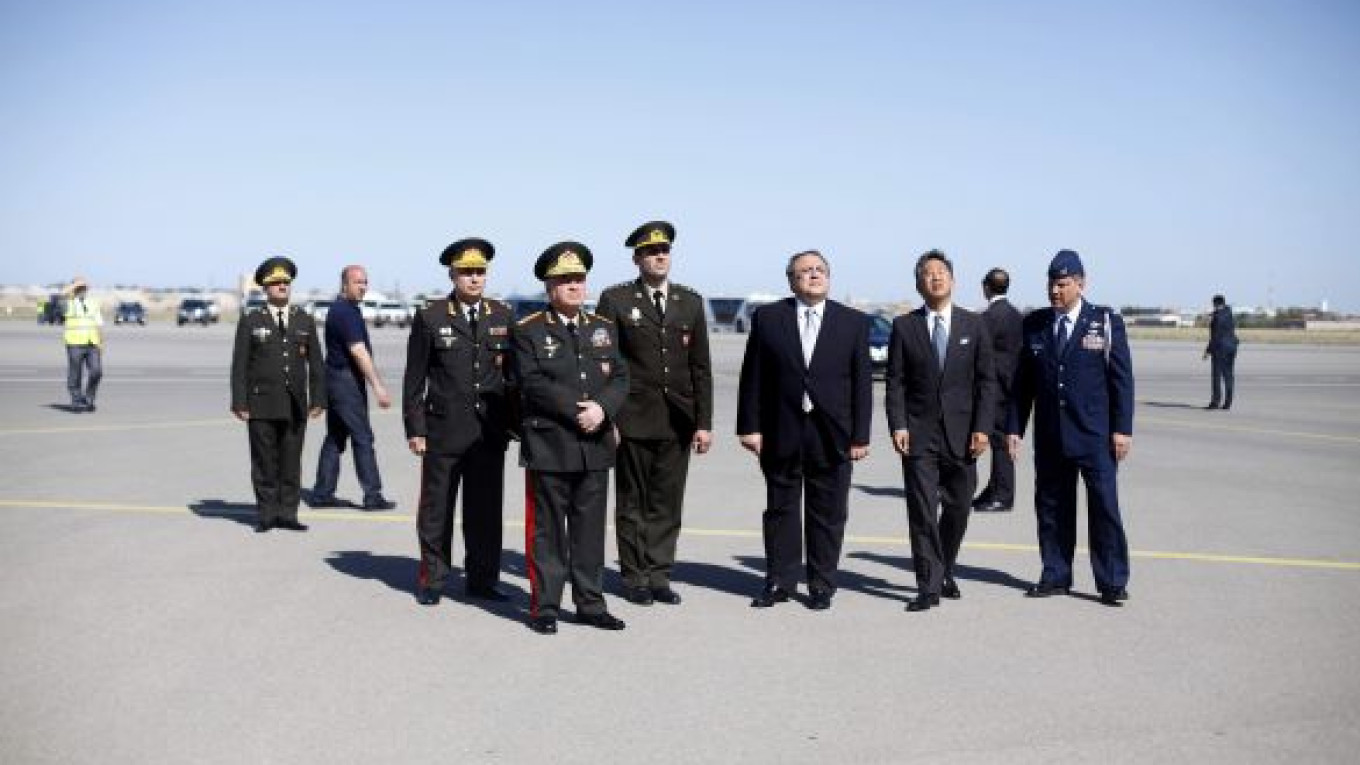BAKU, Azerbaijan — The United States sought to shore up a link in its supply chain to Afghanistan on Sunday, sending Defense Secretary Robert Gates to Azerbaijan, a transit point that has complained about not getting enough attention.
Since 2001, tens of thousands of military aircraft and supply trucks have crisscrossed Azerbaijan by air and land, carrying U.S. and NATO forces and equipment to the war zone.
The Pentagon wants to make sure that there are not any problems that could slow U.S. President Barack Obama's 30,000-troop surge.
As part of the Obama administration's campaign to keep Azerbaijan on board, Gates sandwiched a less than 24-hour stop in Baku, the capital, in between talks in Asia and Europe about the crisis on the Korean Peninsula and the war in Afghanistan.
He said the trip was spurred, in part, by "concerns in Azerbaijan that we weren't paying enough attention to them."
"It's important to touch base and let them know that in fact they do play an important role in this international coalition," Gates told reporters on his plane before landing.
To underline the message that the United States was paying more attention to Azerbaijan, Gates hand delivered a letter to President Ilham Aliyev from Obama to make clear "we have a relationship going forward," a senior defense official said.
Gates is the first Cabinet-level official to visit Azerbaijan since Obama came to office last year, and he made clear that more high-level exchanges were planned.
The United States wants to expand military-to-military relations, from training to exercises, officials said.
As part of the outreach effort, the Pentagon sent a senior defense official to meet with the Azeris, and U.S. Secretary of State Hillary Clinton has spoken by phone to Aliyev.
Officials said Azerbaijan told the Pentagon that it was concerned about not getting higher-level visits and about not seeing the fruits of what the United States calls their "strategic partnership."
"The complaints were more about 'Why aren't you taking our concerns seriously? You need to show us that you're taking our concerns seriously.' So we got the message," the senior defense official said. "You can't argue with perceptions. They are what they are. And so we've been trying to redress that."
Aliyev has been particularly critical of Washington's role in its festering conflict with Armenia over the breakaway mountain region of Nagorno-Karabakh.
Azerbaijan believes that the United States has been siding with Armenia in the conflict over the rebel region, where ethnic Armenians backed by Armenia threw off Azeri rule in the early 1990s in a war that killed 30,000 people. A peace deal has never been signed.
Gates will try to allay Aliyev's concerns about Nagorno-Karabakh, an official said without elaborating.
Azerbaijan is part of what the United States refers to as the Northern Distribution Network, which also involves Russia, Latvia, Georgia, Kazakhstan, Tajikistan and Uzbekistan.
Disruption fears have risen in recent months.
In April, operations at the Manas military air base in Kyrgyzstan, an important support hub for the war, were briefly suspended after violent riots toppled Kyrgyz President Kurmanbek Bakiyev. It is unclear how long the new government there will keep the base open.
Gates played down the impact of recent interruptions in fuel supplies to Manas, saying, "I don't have the impression they've caused any problems at this point."
A dispute between Central Asian nations Tajikistan and Uzbekistan has also disrupted food and fuel supplies at times.
Some cargo containers are delivered to Kazakhstan by rail from Latvia via Russia. Others cross Georgia and Azerbaijan by land before being shipped to Kazakhstan across the Caspian Sea.
From Kazakhstan, trains deliver cargo to Uzbekistan. After that, supplies can be either shipped by trucks straight across the border to Afghanistan or moved by rail further to Tajikistan, which also borders Afghanistan.
Gates said the United States has "multiple avenues" to route supplies to Afghanistan to limit the impact of any disruptions in any one country.
But the Northern Distribution Network has gained in importance both because of the increase in troop numbers and because of attacks on U.S. cargo shipments through Pakistan, officials said.
"I don't feel anybody in particular has us over a barrel but clearly the ability to overfly Azerbaijan, the ability to use ground transportation through Azerbaijan — as with Russia, as with Kyrgyzstan — is obviously important," Gates said.
"These are the most efficient and cost effective ways to get supplies to the international coalition in Afghanistan and to the Afghan forces themselves," he added.
A Message from The Moscow Times:
Dear readers,
We are facing unprecedented challenges. Russia's Prosecutor General's Office has designated The Moscow Times as an "undesirable" organization, criminalizing our work and putting our staff at risk of prosecution. This follows our earlier unjust labeling as a "foreign agent."
These actions are direct attempts to silence independent journalism in Russia. The authorities claim our work "discredits the decisions of the Russian leadership." We see things differently: we strive to provide accurate, unbiased reporting on Russia.
We, the journalists of The Moscow Times, refuse to be silenced. But to continue our work, we need your help.
Your support, no matter how small, makes a world of difference. If you can, please support us monthly starting from just $2. It's quick to set up, and every contribution makes a significant impact.
By supporting The Moscow Times, you're defending open, independent journalism in the face of repression. Thank you for standing with us.
Remind me later.


